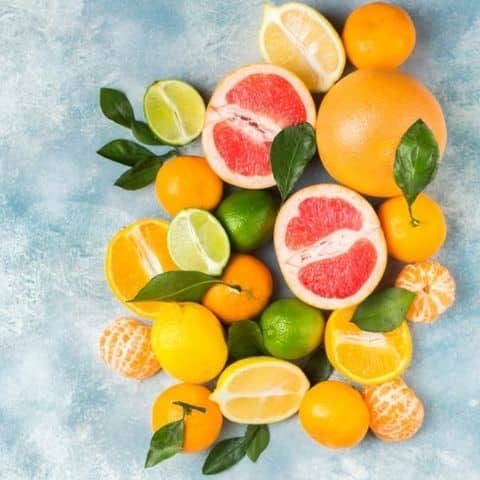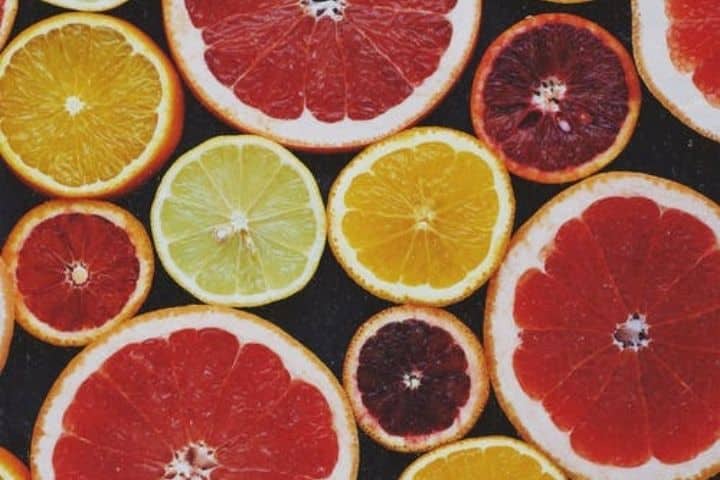Can Vitamin C help fight HPV?
Table of Contents
Remember when your mom told you to eat your apples and oranges to fight colds and flu? She was onto something!
Vitamin C does it all – boosting energy, improving skin quality and mood, supporting iron absorption, and functions as an antioxidant and immune support.
Vitamin C, also known as ascorbic acid, is a water-soluble vitamin that plays an important role in human health. Vitamin C is an essential vitamin for humans, as we are unable to make it on our own. This makes it very important to get enough of this crucial vitamin through our diets or supplementation.
Vitamin C is most known for its role in fighting colds and flu. However, this vitamin is also essential for maintaining the structure and function of our skin tissues. It is involved in the creation of collagen for your skin and fuel for your cells and neurotransmitters. It is also a strong antioxidant, meaning it neutralizes toxic substances in your body.
This powerful vitamin is also an important player in supporting HPV infections.
Benefits of Vitamin C
The mechanism behind many of these benefits comes from Vitamin C’s role in managing oxidative stress. Oxidation occurs when the body breaks down proteins and cells, creating free radicals. These free radicals contribute to cellular damage. Vitamin C (an antioxidant) combats oxidative stress by neutralizing free radicals.
These antioxidant effects help protect connective tissue and form collagen layers in our skin tissues. Vitamin C also supports the immune system by neutralizing pathogens and inflammation which helps immune cells perform their job effectively.
New research sheds light on the connection between Vitamin C status and cancer risk. The study found that Vitamin C from fruits and vegetables was associated with a lower risk of cancer by decreasing the formation of carcinogens in your body.
Vitamin C levels are a good way to measure a healthy lifestyle and can be associated with heart health and decreased risk of strokes.
Let’s not forget the good old-fashioned common cold. Many people take Vitamin C at high doses to prevent colds, or shorten the duration and decrease the intensity of colds. Vitamin C has an anti-histaminic effect at high doses, which is likely to help with colds as well as allergies.

Vitamin C Deficiency
Vitamin C deficiency is famous for causing scurvy back in the days where men would be on ships for long periods, or during times of war and famine. Surprisingly enough, scurvy has been seen more recently in some university student populations.
The most common cause of Vitamin C deficiency is due to poor diet, alcoholism, anorexia, or smoking. Because Vitamin C is widely obtained from fruits and vegetables, it takes several months of poor nutrient intake for severe deficiency to develop.
Vitamin C deficiency can present with symptoms such as fatigue, malaise, and inflammation of gums.
Because vitamin C is an important component of collagen production, deficiency can result in skin conditions like keratosis pilaris, where rough, bumpy skin appears on the back of the upper arms and thighs. Skin may also appear dry, damaged, and bruise easily.
Vitamin C deficiency may also lead to slow-healing wounds, joint pain and it may contribute to iron-deficient anemia by reducing the absorption of iron from plant-based foods and negatively affecting iron.

How much Vitamin C do I need?
Vitamin C can be easily obtained through eating a fruit and vegetable-rich diet.
The recommended daily intake of Vitamin C is about 75 to 90mg. One kiwi contains about 75mg of vitamin C, an orange 83mg, and Brussel sprouts 70mg of vitamin C. Taking an additional 500mg in supplement form can provide an added positive effect.
The Vitamin is considered quite safe, the tolerable upper intake of vitamin C is around 2000mg a day for adults.
Food Sources
Food sources of Vitamin C includes:
- Citrus fruits, including lemons, oranges, grapefruit, kiwi)
- Bell peppers (specifically red and green)
- Broccoli
- Strawberries
- Brussels sprouts
- Tomatoes
- Cantaloupe
* It’s important to remember that Vitamin C content may be decreased with heat and prolonged storage.
Remember that significant amounts of vitamin C in food are lost during high-temperature cooking, and during prolonged warming (i.e. keeping meals warm at 75°C for 4 hours). To get the most vitamin C intake from food, cook foods at lower temperatures and for shorter durations if possible, or opt for raw versions of foods when applicable.
Vitamin C’s Role In HPV
Vitamin C’s antioxidant and immune support properties explain Vitamin C’s important role in HPV clearance.
Vitamin C may be useful in preventing and treating a wide range of conditions. Many studies are showing that this Vitamin may even help treat and prevent cervical dysplasia due to HPV infection.
Persistent HPV and Vitamin C
A study in the Journal of Infectious Diseases found that the risk of type-specific persistent HPV infection was lower among women reporting the highest intake of Vitamin C in the study, compared to those reporting the lowest intake.
CIN and Vitamin C
Another study in the International Journal of Gynecological Cancer looked at whether dietary supplements, such as Vitamin C and multivitamins, were associated with cervical intraepithelial neoplasia (CIN), and found that dietary supplements may reduce the risk of CINs in women with high-risk HPV infections.
Natural sources of vitamin C include citrus fruit, cantaloupe, broccoli, Brussels sprouts, cauliflower, and potatoes as well as through supplements like Papillex. Relief of HPV symptoms is another amazing reason to increase your daily intake of fruits and vegetables, and to try taking Papillex!
Vitamin C for Genital Warts
The immune-boosting properties of Vitamin C, along with its propensity for wound healing and creating healthy skin tissue also makes it an important ingredient in treating HPV complications like genital warts.
Studies have found oral intake of 1000mg of Vitamin C per day shortens the time of genital wart remission and marginally decreased the rate of recurrence compared to controls.
Obtaining Your Daily Dose
Obtaining a healthy level of Vitamin C can be as simple as adopting a healthy lifestyle and eating a diet rich in a variety of fruits and vegetables.
For example, having a kiwi with your breakfast, a serving of broccoli at lunch, and fresh tomato sauce at dinner can naturally replenish your body’s stores of Vitamin C. Remember, consistency is key. Eating fruits and vegetables throughout the day regularly is the best way to support our natural stores.
Supplementing with Papillex also offers a serving of 100 percent the daily value of Vitamin C.
Share: